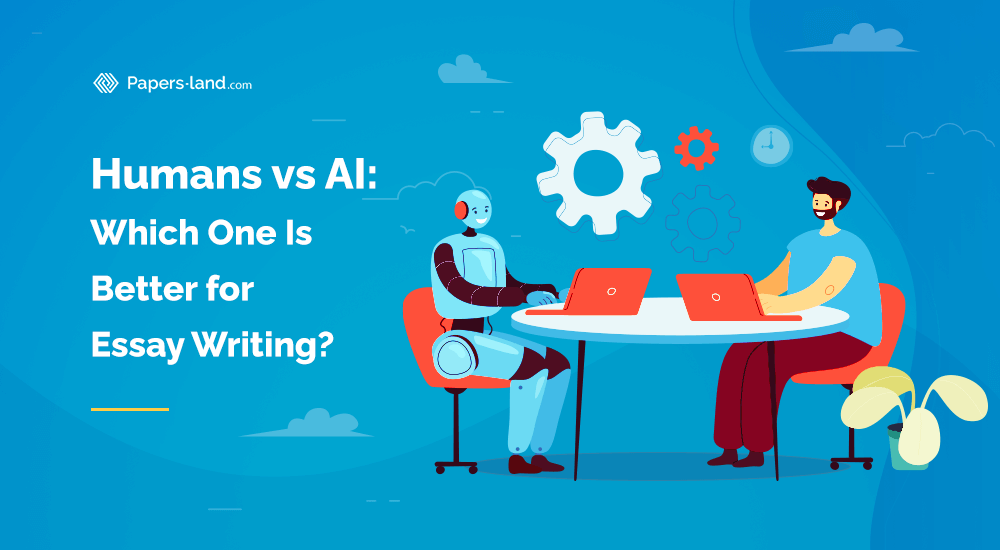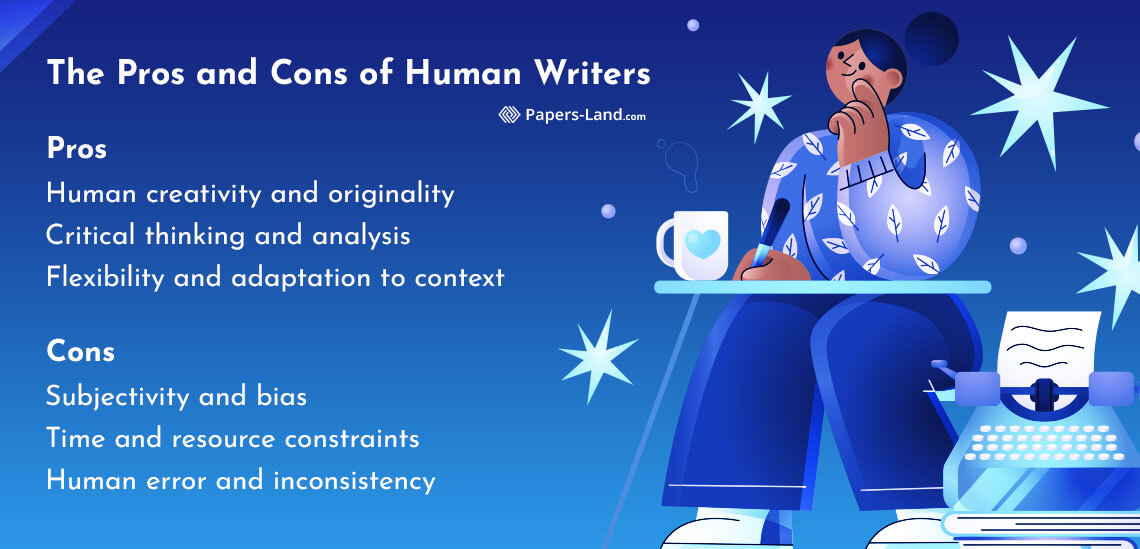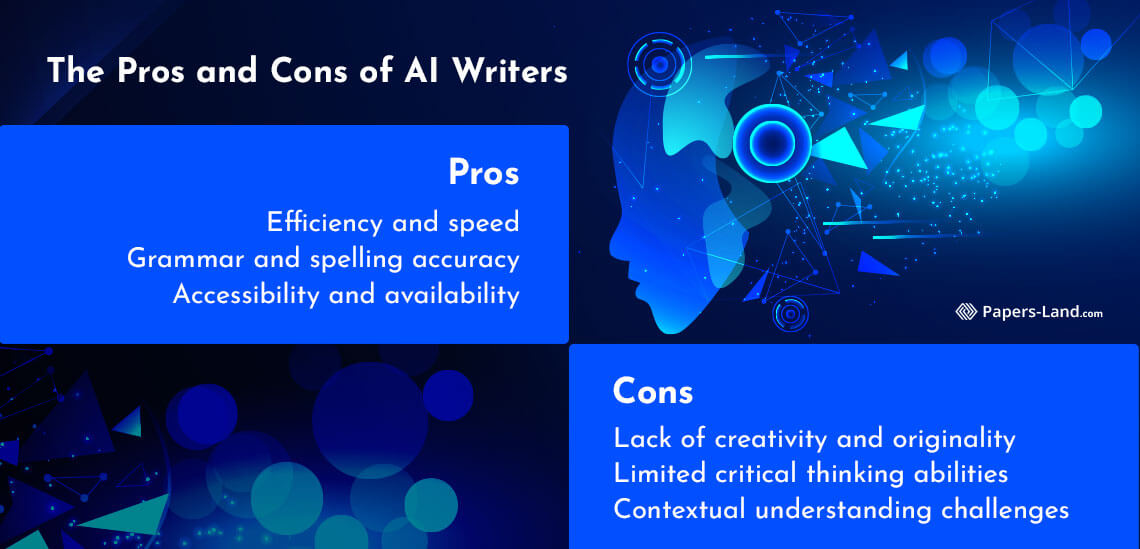


May 16, 2023
Essay writing plays a crucial role in education and communication. It serves as a medium for students and individuals to express their thoughts, opinions, and arguments on various topics. In recent years, artificial intelligence (AI) has made significant advancements, raising the question of whether humans or AI are better suited for essay writing. This blog post aims to explore the advantages of human essay writing as well as the benefits that AI brings to the table.
One of the key advantages of human essay writing lies in the realm of creativity and originality. Humans possess a unique perspective and the ability to infuse their essays with personal experiences and emotions. This allows them to craft authentic and engaging pieces that resonate with readers. Unlike AI, humans can provide a personal touch that cannot be replicated.
Critical thinking and analysis are fundamental skills in essay writing. Humans excel in evaluating complex ideas, dissecting arguments, and providing insightful analysis. They possess the ability to integrate diverse sources and viewpoints, enabling them to present a well-rounded perspective. This multifaceted approach to essay writing sets human writers apart from AI, as they can navigate through complex concepts and draw meaningful conclusions.
Another advantage of human essay writing is the flexibility and adaptation to different contexts. Humans can tailor their essays to specific requirements, such as adhering to particular formats or addressing specific criteria. Additionally, they can adjust the tone and style of their writing to suit different audiences, ensuring that the message is effectively conveyed. This adaptability adds a layer of customization that AI lacks.

AI brings efficiency and speed to the essay writing process. With automated research and data processing capabilities, AI algorithms can quickly analyze vast amounts of information, extracting relevant data for use in essays. This saves significant time and effort in the research phase. Moreover, AI can rapidly generate content based on the provided inputs, enabling writers to produce essays more efficiently.
AI excels in grammar and spelling accuracy. Automated proofreading and error correction tools ensure that essays are free from grammatical mistakes, spelling errors, and punctuation issues. AI algorithms can consistently maintain proper language usage, eliminating the need for extensive manual proofreading. This aspect of AI saves time and enhances the overall quality of the written content.
Accessibility and availability are notable advantages of AI in essay writing. AI-powered language translation capabilities enable writers to overcome language barriers, expanding their reach and enabling cross-cultural communication. Additionally, AI tools are available 24/7, providing writers with constant access to essay writing assistance and resources. This accessibility ensures that individuals can work on their essays at any time, making the process more convenient.

Despite their strengths, human writers are not immune to subjectivity and bias. The influence of personal opinions and beliefs can inadvertently seep into their writing, potentially leading to a skewed perspective. This subjectivity may result in the exclusion of diverse viewpoints or the promotion of discrimination or unfair treatment. It is essential for human writers to remain conscious of their biases and strive for objectivity in their essays.
Human essay writing is often constrained by time and limited resources. Extensive research can be time-consuming, making it challenging for human writers to delve deep into a topic or explore multiple perspectives thoroughly. Tight deadlines can further hinder the ability to conduct comprehensive research. These time and resource constraints can limit the depth and breadth of human-written essays.
Humans are prone to errors and inconsistencies in their writing. Typos, grammar mistakes, and formatting errors can inadvertently slip through, even after proofreading. Additionally, there may be variations in writing style or structure from one essay to another, which can affect the overall coherence and readability. While humans strive for accuracy and consistency, these shortcomings are inherent in the writing process.
One significant drawback of AI in essay writing is the lack of creativity and originality. AI algorithms may generate repetitive and generic content, lacking the ability to provide a fresh perspective. Moreover, AI struggles to express emotions or incorporate personal experiences into essays, resulting in a more detached and impersonal tone. The absence of a human touch can make the content less engaging and relatable.
Critical thinking is a vital aspect of essay writing, requiring the ability to analyze and evaluate complex ideas. While AI algorithms can process vast amounts of data, they may struggle with nuanced analysis and comprehensive evaluation. AI often relies on predefined algorithms and patterns, which may limit its capacity to think critically and independently. The depth of analysis provided by AI may not match the level of insight offered by human writers.
AI faces challenges in understanding subtle nuances and context. Essays often require a deep understanding of the topic, including its cultural, historical, and social aspects. AI algorithms may struggle to grasp these complexities fully, leading to misunderstandings or inaccuracies in the content. Additionally, AI may have difficulty adjusting the tone or style of writing based on the specific audience or context, potentially compromising the effectiveness of the essay.
To overcome the limitations of both humans and AI, a collaborative approach can be highly beneficial. AI can serve as a writing assistant, automating research and data gathering processes. By leveraging AI tools, human writers can access a vast array of information, saving time and enhancing the quality of their research. Additionally, AI-powered grammar and spelling checks can help eliminate errors and ensure accuracy in the final essay.
AI can aid in the initial stages of content generation by providing ideas and outlines for essays. By analyzing existing data and patterns, AI algorithms can generate suggestions and prompts that can jumpstart the writing process. This can streamline the initial brainstorming phase and provide writers with a foundation upon which they can build their unique perspectives and arguments.
They ensure that the essay flows smoothly, transitions seamlessly between ideas, and maintains a logical structure. Human writers possess the ability to refine the content generated by AI, injecting creativity and originality into the essay. They can infuse personal experiences, emotions, and unique perspectives that resonate with readers. Through their expertise, human writers ensure coherence, clarity, and a captivating writing style that engages the audience effectively.
By combining the strengths of AI and human writers, a collaborative approach emerges, where AI serves as a powerful tool to augment human capabilities. AI can assist with time-consuming tasks, automate processes, and provide valuable insights. Meanwhile, human writers bring their creativity, critical thinking, and contextual understanding to produce essays that are intellectually rigorous and emotionally compelling.
In the ongoing debate of humans vs AI in essay writing, it is evident that both sides bring unique advantages and limitations to the table. However, when it comes to the creation of high-quality, engaging, and impactful essays, human-generated content holds a distinct edge over AI-generated content.
Human writers offer a range of qualities that make their essays stand out. Firstly, human-generated content brings a level of creativity and originality that cannot be replicated by AI. Humans possess a unique perspective, enabling them to infuse their essays with personal experiences, emotions, and diverse viewpoints. This personal touch creates a connection with readers, making the content relatable and engaging.
Secondly, human writers excel in critical thinking and analysis. They possess the ability to evaluate complex ideas, analyze arguments, and present well-rounded perspectives. Humans can integrate diverse sources and viewpoints, ensuring a comprehensive exploration of the topic. This multifaceted approach to essay writing adds depth and credibility to the content.
Furthermore, human writers demonstrate flexibility and adaptation to different contexts. They can tailor essays to specific requirements, such as adhering to particular formats or addressing specific criteria. Humans are adept at adjusting the tone and style of their writing to suit different audiences, ensuring effective communication. This customization enhances the impact of the essay and resonates with readers on a deeper level.
When seeking human-written essays, Papers-Land.com writing service stands out as a reliable and professional choice. Here are the pros of opting for Papers-Land.com:
Get professional assistance from the best writer.
In conclusion, while AI has made significant advancements in various fields, when it comes to essay writing, human-generated content prevails. The creativity, critical thinking, and adaptability of human writers contribute to the creation of essays that are authentic, engaging, and thought-provoking. For those seeking high-quality, customized essays, Papers-Land.com writing service offers the expertise of human writers who ensure originality, precision, and timely delivery. By choosing human-written essays, individuals can confidently present their ideas and arguments in a way that is intellectually stimulating and emotionally resonant.